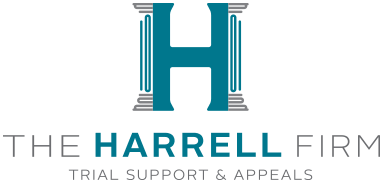Do you only handle cases in Jacksonville.
No. Most appellate work can be done remotely, meaning I can help you no matter where you’re located. I’ve handled appeals in every Florida appellate court and have appeared pro hac vice in the Georgia Supreme Court and the Georgia Court of Appeals.
What is “trial support”?
Trial support means I can help you with legal research and writing in the trial courts. I can handle substantive motions and responses, Daubert motions, motions in limine, draft non-standard jury instructions, and even assist during your trial. I can also draft or respond to post-trial motions. Not only can I free up your valuable time to focus on preparing for trial, I can help make the necessary legal arguments to ensure that your case is in the best posture in the event of an appeal.
Why should I hire an appellate attorney?
There’s a reason The Florida Bar recognizes Appellate Practice as its own specialization area. An appeal is completely different from a trial. The rules are different, the way of presenting arguments is different, and the amount of time consumed by handling an appeal is substantial. Appellate attorneys are skilled at legal research and writing; we devote the time to knowing your case and the law. By calling on these skills, appellate attorneys are able to write a brief that is clear, concise, and persuasive. In short, while trial lawyers are generally gifted oral advocates, an appellate attorney knows how to posture your case for the best chances of success on appeal.
What does it mean to be Board Certified by The Florida Bar in Appellate Practice?
It means that in the 5 years leading up to my certification period, I presented 5 or more oral arguments, I had primary responsibility on 20 or more principal briefs, I took 45 or more hours of appellate-specific Continuing Legal Education courses, and I received recommendations from judges and my peers attesting to my skills and ethics. I have to continue to maintain these high standards by renewing my certification every 5 years.
Can I see an oral argument you’ve done?
Click this link to see an oral argument in a nursing home arbitration case before the First District Court of Appeal.
Can I see an example of your writing?
Of course. Click this link to read the Initial Brief in Harris v. Oak View Rehabilitation Center before the First District Court of Appeal.
Do you handle criminal appeals?
No. My speciality is handling civil appeals only.
I received an order I want to appeal, now what?
The first step is to determine whether you have an appealable order. Not every decision of the trial court can be appealed. The Florida Rules of Appellate Procedure detail what orders can be appealed and provide strict timelines for filing your notice of appeal and brief. Generally, a notice of appeal must be filed within 30 days of rendition of the order, but you should always verify this with your attorney. Even if you don’t have the right to file an appeal, you might be able to file an original petition in the appellate court, which procedure has its own set of rules. The best practice, if you have received an adverse ruling, is to contact an appellate attorney to determine if you can seek immediate recourse from the appellate court.
How is an appeal different from what happened in the trial court?
In an appeal, three judges hear your case instead of one. But these judges will not hear any new argument or evidence. They rely on what is called the “record,” or all of the evidence presented and arguments raised in the trial court. An appellate attorney reviews the complete record, distills it down to only the pertinent information, and presents that information in a compelling and clear way in a document called a “brief.” A brief generally can be as long as 50 pages. It contains citations to the record for every fact asserted, and it backs up every legal argument with case law. If requested by a party, the appellate court may grant “oral argument,” during which time each side will have 15 minutes to answer the court’s questions about the case.
What happens at oral argument?
At oral argument, the appellant or petitioner will present argument first. That side will reserve a certain amount of their 15-minute allotment for rebuttal time. An effective appellate advocate will jump to heart of the argument, knowing that the 3-judge panel can (and likely will) interrupt with questions at any time. A common misconception is that oral argument is a chance for the parties to present their case. This is not like a closing argument in the trial court. Rather, oral argument is an opportunity to address the judges’ concerns head-on and convince them of the merit of your position. An effective appellate advocate will treat oral argument like a scholarly discussion with the judges. When the appellant’s time has expired, the appellee or respondent will have 15 minutes to engage in the same type of question-and-answer discussion. The appellant or petitioner will then have whatever time is remaining for a brief rebuttal. Most Florida appellate courts offer live streaming of oral arguments, so you should be able to watch your appellate counsel present argument without traveling to the courthouse in person.
How long will an appeal last?
The length varies depending on the court and the complexity of the case. The trial court clerk has to prepare the record on appeal, the parties file an initial brief, an answer brief, and a reply brief. The three-judge panel then has to consider the record and the briefs, and sometimes hold oral argument. And once a decision is made, under limited circumstances, the parties can move for rehearing or clarification. As a general rule, count on an appeal taking at least a year.

